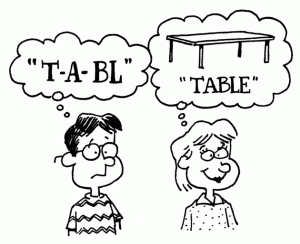 In this post I would like to show
the importance of basics when it comes to reading. Like every other academic
subject that is taught in schools, there are necessary basics when it comes to
reading as well. It is not just enough to know a word when you see it. It is
just as important to know the sounds that are put together to form a word as
well as what the word really means. (1)
In this post I would like to show
the importance of basics when it comes to reading. Like every other academic
subject that is taught in schools, there are necessary basics when it comes to
reading as well. It is not just enough to know a word when you see it. It is
just as important to know the sounds that are put together to form a word as
well as what the word really means. (1) At the
young age of six, I was taught many different syllables in both the
French and the English languages. I remember being in Senior Kindergarten and clapping our hands together at circle time as an activity to determine the number of syllables that were present in a word. To this day, that trick is still useful to decode the less obvious words.
At the
young age of six, I was taught many different syllables in both the
French and the English languages. I remember being in Senior Kindergarten and clapping our hands together at circle time as an activity to determine the number of syllables that were present in a word. To this day, that trick is still useful to decode the less obvious words.
Those syllables were taught to us and they built us
a concrete base before we began to learn how to read. From my personal
experiences of listening to children read at Club de Devoirs at Monseigneur
Augustin Caron, I have noticed that learning syllables is no longer a priority
before teaching a child how to read. Most students are playing guessing games while reading instead of taking the time to properly decode words.
 Now in most cases, students are
just being given a small book to bring home to read for homework in hopes that
their parents will teach them the ins and the outs of reading. I find that
because children aren’t being forced to learn syllables before they start
reading, that they are having a harder time pronouncing words and comprehending
what they are reading as they get older. I believe that syllables should be
prioritized before children begin to read. Once they have syllables as their base, they are able to read almost every word.
Now in most cases, students are
just being given a small book to bring home to read for homework in hopes that
their parents will teach them the ins and the outs of reading. I find that
because children aren’t being forced to learn syllables before they start
reading, that they are having a harder time pronouncing words and comprehending
what they are reading as they get older. I believe that syllables should be
prioritized before children begin to read. Once they have syllables as their base, they are able to read almost every word.
The lack of
basics being taught when it comes to reading is only giving students a harder
time as they get older. In my opinion, without a base of syllables, students
will find it more challenging when they go to read longer and more complicated
words in the future. By giving students a strong base before they learn how to read, it’s only making them more confortable and at ease when they
need to read in front of a crowd or a group of people.
 I believe
that learning the ins and the outs of reading at a young age is very important
in order for students to improve as they eventually explore more complicated
forms of writing in the future. Being able to recognize syllables will allow students
to become more efficient and more fluent readers. (2) Learning to decode words
not only makes the pronunciation easier, but it also helps a child with his or
her spelling habits, which leads me into the topic of my next post. (2)
I believe
that learning the ins and the outs of reading at a young age is very important
in order for students to improve as they eventually explore more complicated
forms of writing in the future. Being able to recognize syllables will allow students
to become more efficient and more fluent readers. (2) Learning to decode words
not only makes the pronunciation easier, but it also helps a child with his or
her spelling habits, which leads me into the topic of my next post. (2)
I am loving your blogs! I completely agree with you and can see where you are coming from. The system just isn't the same anymore, and although the curriculum claims to be altering their teaching ways for each child, they are skipping many important basic aspects, such as reading. Maybe it's that teachers assume the child knows more than they actually do. More time should be spent with the students making sure they are on the right track!
ReplyDelete